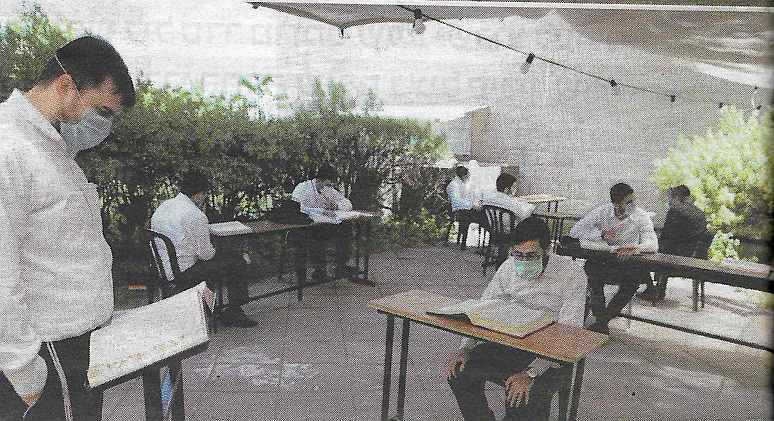  |
|
| ||||||
This Google Custom Search looks only in this website. HaRav Aviezer Piltz Describes the Wealth of Sefiras HaOmer in the Pandemic
Torah study is in full swing in Yeshivas Tushiya "in" Tifrach, that is, in the homes of the talmidim where three full daily sessions are kept, in accordance with the directives of Torah leadership. The shiurim and shmuessen are delivered by the Rosh Yeshiva and the ramim, with the participation of the students via phone hookup.
On Motzoei Shabbos Acharei Mos, the Rosh Yeshiva, HaRav Aviezer Piltz, gave a rousing talk from his home which was heard by the hundreds of students, past and present, by phone as well.
Rosh Yeshivas Meor HaTalmud, HaRav Avrohom Yitzchok Hakohen Kook, expressed himself with incisive and inspiring words to the yeshiva students who submerge themselves in study via the telephone throughout the three daily sessions. Among other things, he said, "This period has a special significance and proclivity to elevate us and fortify us in an amazing way. If at normal times we study Torah with the strength of numbers, of the public, and then the individual is caught up and energized thereby.
One day some years ago, a rosh mesivta from Yeshivas Torah Chaim in Russia came to the home of HaRav Aharon Leib Shteinman zt"l with a question which had been bothering him for quite a while. He can't help noticing how many young men who previously did not even know the alef-beis were being transformed into practicing Jews in his yeshiva. They left everything behind and within a short time, actually became esteemed Torah scholars who have even been accepted in the finest yeshiivos in Eretz Yisroel and proven to be outstanding even there!
"How has this transformation come about in such a short time?" he asked.
Originally published twenty years ago, this essay has special meaning in these times when so much of daily life is severely disrupted.
Like His Master, Yet Not to be Trusted?
[Many of Chazal's statements attest to the outstanding qualities of Avrohom Ovinu's servant Eliezer.] "And Avrohom said to his servant, the elder of his house, the controller of all he owned . . . " (Bereishis 24:2). Chazal (Bereishis Rabba 59:8) interpret the word zekan, as being composed of the initials of the words ziv eikunin, meaning appearance, and they learn from this that Eliezer's appearance was similar to that of Avrohom Ovinu.
They interpret the words, "the controller of all he owned," to mean that Eliezer had the same degree of control over his yetzer hora as Avrohom Ovinu had over his.
From Our Archives
I hung up the phone and grinned in anticipation. My married- for-three-months daughter, Rena, would be coming to us for Shabbos and I was looking forward to spending time with her, hearing how life was coming along. She'd been calling home once or twice a week since she'd been married, asking how to get ink out of shirts or what kind of cake to make for dessert when there wasn't much flour in the house, and although these were quickie calls (dialed at prime time), they amused me no end.
Rena, while still living at home, would politely and gently hint that I was baking, cleaning or laundering all wrong and would be better off doing it her way. Now that she was married, she was calling me for advice! Pretty funny. We're very similar types and have, boruch Hashem, usually gotten along well, so that her implied criticism back then hadn't even bothered me. Now I just give her the information she wants without rubbing it in.
PREPARING FOR THE FUTURE: What is Best for Shimshi?
by R' Zvi Zobin
The doctor finished examining little Chaim, wrote out a prescription and then turned to Chaim's mother. "You are looking pale, Mrs. Reuben. Are you feeling alright?" he asked.
"Well, I'm feeling very tired," she replied. The doctor turned back to his pad and wrote out another prescription.
"Here, Mrs. Reuben, try this; it should take away the tiredness."
Charting a Course through the Antisemitism
by Mordecai Plaut
From a historical perspective it seems likely that the way the world has related to Jews in the past year is a return to "normalcy" and the relatively benign view of us that has dominated public discourse in the past half-century is the aberration.
We should be used to the suspicion and hatred of the world; we have endured it very steadily for more than two millennia. The venom that is directed our way in Durban or on the streets of Paris or Belgium recalls our experiences in Berlin of the 1930s, Poland of the 1640s or North Africa in the 1100s.
We had a pleasant break from it all, which perhaps helped foster the illusion that we were cured of the exile by the secular state. Now it is clear that it was only a temporary respite and that we have suffered a relapse.
EARLIER EDITORIALS
A Mission to Spread
Daas Torah
Looking for the
Best in Yiddishkeit
The Immorality
of Palestinian Combatants and Noncombatants
|
||||||




.jpg)



